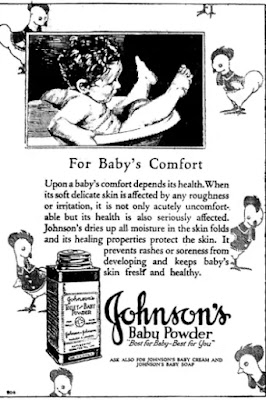 |
| Misleading ad by J&J Co. Sydney Morning Herald |
 |
| Naturally occurring talk or soapstone. usian.org |
Talc is associated with metamorphic rocks, in foliated masses, and in certain rocks. It occurs along with with serpentine, tremolite, forsterite, and almost always with carbonates (calcite, dolomite, or magnesite) in the lower metamorphic facies. It also occurs as an alteration product, as from tremolite or forsterite. Talc is magnesium silicate and has a simple constant chemical composition - Mg3Si4O10(OH)2. Hence it is often found in the ground in close proximity to asbestos minerals - Serpentine group or Amphibole group.
Unlike talcum face and body powder for men, baby talcum powder needs special care and attention as the baby is sensitive to certain unknown chemicals. In the past several months incriminating media reports are appearing in the US about Baby Talcum powder made by the world famous Johnson and Johnson Company about the safety of their talcum powder products that are tested positive for small amounts of cancer-causing asbestos. The expose was made by Reuters which claim that from 1971 to the early 2000s
the company’s executives, mine managers, doctors and lawyers were aware that raw talc and finished powders sometimes tested positive for small amounts of asbestos and failed to disclose the information for various obvious reasons. However, J&J refused to comment on the media reports. What surprised the US public was a responsible company like J&J, for more than two months, turned down repeated requests for an interview with its executives.
A large section of the American public panicked and some went to court to sue the company for lack of transparency on the product and utter disregard for talcum powder user's safety. Responding to public outcry, a jury in St Louis, Missouri initially awarded £418 million in compensation and added £ 3.1billion in punitive damages in the latest court case against pharmaceutical giant Johnson & Johnson. Mind you, the payout amount is just 6.17 per cent of the firm's £58.35billion annual revenue; just imagine the mark-up on J&J's products. Since Reuters story on J&J's Talcum Powder products, some 9,000 legal cases have been in the court involving its signature baby powder. In July J&J was ordered by the court to shell out £3.6 billion to 22 women after asbestos in its products gave them ovarian cancer. During the six-week trial, the women and their families claimed that they developed ovarian cancer only after using baby powder and other talc products for a long period. Their lawyers impressed on the jury that the company had been aware of asbestos contamination in the powder since the 1970s but failed to warn buyers about the risks. At health risk were its innocent regular customers who were hoodwinked by the company.
The firm maintains that several studies have concluded its talc is safe and insisted the verdict was a “fundamentally unfair process”.
A study commissioned by the US Food and Drug Administration (FDA), after testing a variety of talc samples, including J&J, from 2009 to 2010, found no asbestos in any of them. However, the prosecution lawyer told the court that FDA and Johnson & Johnson, had used flawed testing methods.
 |
| Naturally occuring asbestos Wikipedia |
 |
| IndiaMART |
 |
| J&J CO Headquarters, USA glassdoor.com |
In the wake of this revelation by Reuters months ago, in the middle of December this year J&J's shares plunged considerably. Reuters made their investigation public after scrutinizing thousands of company documents related to talcum powder. Reuters claimed that the executives and others were aware of a small amount of asbestos in Talcum powder and they failed to alert the authorities about the possible risk. The company accused Reuters of publishing a false, and biased report to sully its name. Reuters also reported that the company failed to block the federal regulation further to reduce the asbestos level in the talc-based consumer products.
https://www.thesun.ie/news/3517347/johnson-johnson-knew-for-decades-there-was-cancer-causing-asbestos-in-its-talcum-powder/
https://edmontonsun.com/news/world/johnson-johnson-hammered-by-report-it-knew-of-asbestos-in-baby-powder/wcm/23d40712-7dc3-47c4-aaf3-59ec0dbe2da7









.jfif)